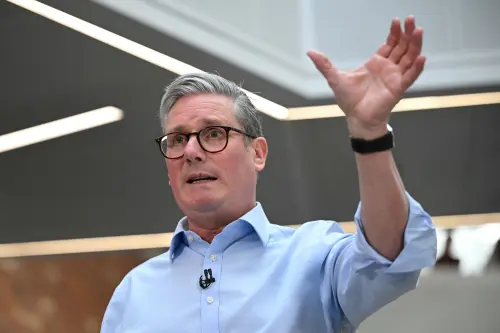British Prime Minister Keir Starmer stated on Saturday that Western allies, excluding the U.S., were intensifying preparations to aid in case of a ceasefire with Russia. Defense leaders are scheduled to finalize "robust plans" next week.
Starmer conducted a virtual meeting to build more pressure on Russian President Vladimir Putin, aligning with current efforts led by U.S. President Donald Trump, with an aim to secure commitments towards any potential agreement.
Approximately twenty leaders participated, including those from Germany, France, Italy, Canada, Australia, Ukrainian President Volodymyr Zelenskiy, and NATO's secretary general. Notably absent from the meeting was the U.S.
Starmer highlighted that the "coalition of the willing" had reaffirmed its dedication to supporting Ukraine against Russia's ongoing invasion and ensuring the success of any ceasefire resulting from Trump's diplomatic gestures with Russia.
While Russia expressed openness to the ceasefire proposal in principle, it also reiterated its war objectives, implying that reaching an agreement may not be swift.
Starmer emphasized the commitment to escalate pressure on Russia, continue providing military assistance to Ukraine, and impose stricter sanctions on Russia to undermine Putin's military capabilities and compel him to engage in negotiations.
Prompted by Trump's decision to reduce support for European and Ukrainian security, other Western nations have taken action.
"Our armed forces will convene this Thursday in the United Kingdom to establish decisive plans to back a peace agreement and uphold Ukraine's future security," Starmer declared.
"President Trump has presented Putin with a path towards lasting peace. Now, it is imperative that we turn this into reality."
Britain and France have expressed readiness to dispatch peacekeepers to Ukraine if a ceasefire materializes, while Australian Prime Minister Anthony Albanese indicated his country's willingness to assist upon request.
Despite potential agreement on a truce, many unknowns persist, including the specifics of the U.S. stance.
Starmer pointed out Ukraine's demand for security guarantees, such as the deployment of foreign troops, stressing the necessity of deterring further Russian aggression.
He reiterated the importance of a security "backstop" endorsed by Washington to dissuade Putin from launching future attacks as the U.S. plays a vital role in NATO's defense capabilities.
"We are in constant communication with the U.S.," Starmer affirmed.
Following Trump's envoy meeting with Putin in Moscow, Trump expressed optimism on Friday, stating there is a "very good chance" for the conflict to conclude.
Kyiv, however, rejects Putin's conditions, which include Ukraine renouncing NATO ambitions and reducing its military size, and proposes Russia's control over disputed Ukrainian territories.
Zelenskiy highlighted the complexity of the territorial issue and rejected recognizing occupied territory as Russian.
It is acknowledged that Ukraine may not regain all lost territories, yet the U.S. reaffirmed its support for Ukraine in defending territorial integrity.
Foreign ministers from major Western nations emphasized the importance of robust security arrangements for Ukraine to deter and defend against potential aggression.
Although Putin's response was deemed inadequate, Starmer stressed the inevitability of future negotiations with Russia.
French President Emmanuel Macron noted Russia's reluctance for genuine peace, observing that Russia seeks to secure its interests first before engaging in negotiations. Macron emphasized the necessity for a clear and coordinated approach with the U.S. to achieve a ceasefire.
